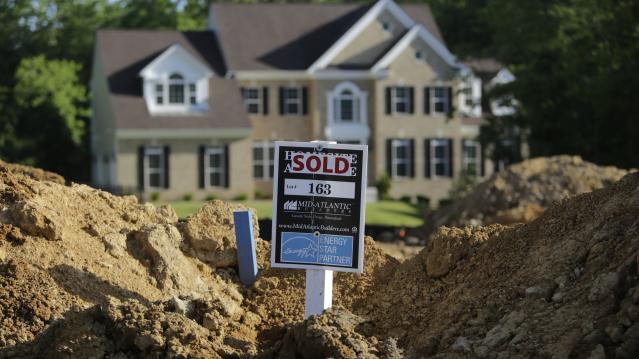How the Stock Market’s Wild Swings Have Helped Homebuyers

The rollercoaster week on Wall Street could pay off nicely for some homebuyers.
The sharp selloff in global markets, caused by the economic uncertainty in China, caused investors running for safety to buy up U.S. government bonds, driving interest rates down. That sent the rate on benchmark 30-year fixed-rate mortgages down to its lowest level since May.
Related: The Financial Mistake That Can Cost Homeowners
Mortgage giant Freddie Mac said Thursday that the average for 30-year fixed-rate loans fell to 3.84 percent, with an average 0.6 points, over the week ending August 27. That’s down from 3.93 percent last week and 4.10 percent a year ago. For 15-year fixed-rate loans, the average was 3.06 percent, down from 3.15 percent last week and 3.25 percent a year ago.
The average on 30-year fixed-rate mortgages has now been below 4 percent for five straight weeks. Just how long they stay there will be determined in part by when the Federal Reserve decides to raise interest rates for the first time since 2006. Many economists had expected the Fed to raise rates next month — but that was before the stock market’s latest shakeup.
"There are indications, though, that the unsettled state of global markets will make the Fed think twice before taking any action on short-term interest rates in September,” Sean Becketti, Freddie Mac’s chief economist, said in a statement. “If that's the case, the 30-year mortgage rate may remain subdued in the short-to-medium term, providing support for continued strength in the housing sector."
Related: Rate-Hike Havoc: Can the Fed Ignore This Market Rout?
Greg McBride, chief financial analyst with Bankrate.com, said mortgage rates may trend a bit higher from here as financial markets settle down, but he added that the Fed’s hike, whenever it comes, isn’t going to dramatically affect mortgage rates that are still historically low.
“That the initial move by the Fed is to a large extent already reflected in mortgage rates,” McBride said. “You might see a little bit of a further bump, but not much. Mortgage rates are not going to skyrocket. That’s the main point. Increases that we see in mortgage rates in the coming months are likely to be very limited."
Top Reads From The Fiscal Times
- The Troubling Truth Revealed by the Stock Market’s Nosedive
- Mark Cuban: The Lesson Investors Can Learn From China
- Why China’s Slowdown Will Lead to Sustainable Growth
Increasing Number of Americans Delay Medical Care Due to Cost: Gallup

From Gallup: “A record 25% of Americans say they or a family member put off treatment for a serious medical condition in the past year because of the cost, up from 19% a year ago and the highest in Gallup's trend. Another 8% said they or a family member put off treatment for a less serious condition, bringing the total percentage of households delaying care due to costs to 33%, tying the high from 2014.”
Number of the Day: $213 Million

That’s how much the private debt collection program at the IRS collected in the 2019 fiscal year. In the black for the second year in a row, the program cleared nearly $148 million after commissions and administrative costs.
The controversial program, which empowers private firms to go after delinquent taxpayers, began in 2004 and ran for five years before the IRS ended it following a review. It was restarted in 2015 and ran at a loss for the next two years.
Senate Finance Chairman Chuck Grassley (R-IA), who played a central role in establishing the program, said Monday that the net proceeds are currently being used to hire 200 special compliance personnel at the IRS.
US Deficit Up 12% to $342 Billion for First Two Months of Fiscal 2020: CBO

The federal budget deficit for October and November was $342 billion, up $36 billion or 12% from the same period last year, the Congressional Budget Office estimated on Monday. Revenues were up 3% while outlays rose by 6%, CBO said.
Hospitals Sue to Protect Secret Prices

As expected, groups representing hospitals sued the Trump administration Wednesday to stop a new regulation would require them to make public the prices for services they negotiate with insurers. Claiming the rule “is unlawful, several times over,” the industry groups, which include the American Hospital Association, say the rule violates their First Amendment rights, among other issues.
"The burden of compliance with the rule is enormous, and way out of line with any projected benefits associated with the rule," the suit says. In response, a spokesperson for the Department of Health and Human Services said that hospitals “should be ashamed that they aren’t willing to provide American patients the cost of a service before they purchase it.”
See the lawsuit here, or read more at The New York Times.
A Decline in Medicaid and CHIP Enrollment

Between December 2017 and July 2019, enrollment in Medicaid and the Children's Health Insurance Program (CHIP) fell by 1.9 million, or 2.6%. The Kaiser Family Foundation provided an analysis of that drop Monday, saying that while some of it was likely caused by enrollees finding jobs that offer private insurance, a significant portion is related to enrollees losing health insurance of any kind. “Experiences in some states suggest that some eligible people may be losing coverage due to barriers maintaining coverage associated with renewal processes and periodic eligibility checks,” Kaiser said.


